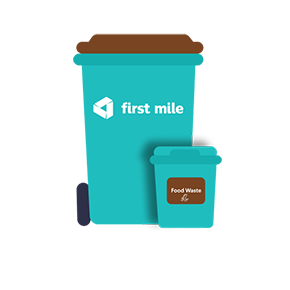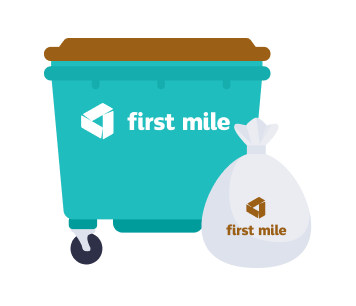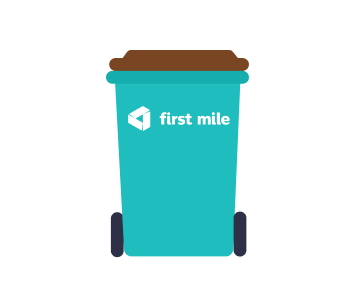The UK coffee market is huge and growing. The major big name coffee shops have expanded their presence in the last 18 months and there are now over 12,000 independent coffee shops across the country.
Add to that the other spots you can grab a coffee – petrol stations, cinemas, offices - we’re a country of caffeine addicts! But how do coffee retailers then handle all the spent coffee grounds, takeaway coffee cups and other waste that is generated from an on-the-go coffee culture?
To talk about the issues facing the sector, we invited Matt Spencer, the Commercial Director at Caffé Nero to be a guest on First Mile’s Climate Heroes podcast.
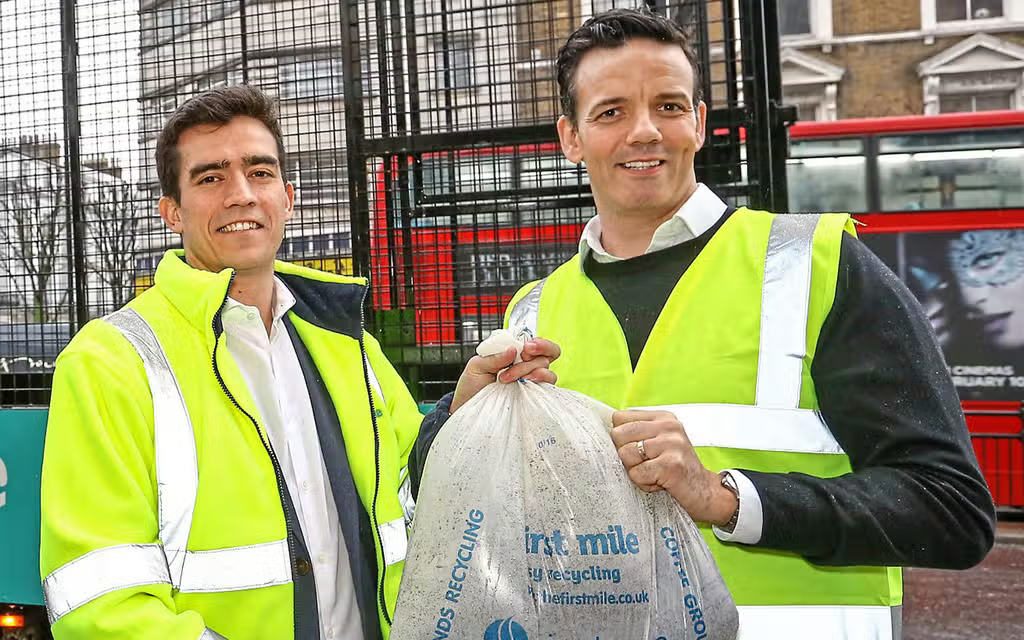
*Matt Spencer alongside First Mile's Chief Commerical Officer Joe Allen
Matt spoke about how Caffe Nero are planning to tackle the new rules around food waste and takeaway cup recycling and the challenges in making a multi-site coffee retailer sustainable.
What are the sustainability issues in the UK coffee industry?
Changing expectations of customers and employees
Podcast host and First Mile founder Bruce noted in the episode how sustainability in the coffee sector is much more of a focus now compared to when Matt joined Caffe Nero 18 years ago. The environmental awareness amongst customers and employees coupled with new legislation means that every business must consider sustainability in their planning to stay compliant and competitive.
Effective waste management practices
Waste and how it’s treated is a big factor in making coffee shops and other hospitality businesses more sustainable, and with the introduction of The Simpler Recycling reforms it will become even more important.
The types and amount of waste produced
The specific types of waste that are produced in the coffee sector and the sheer quantity of coffee grounds and food waste pose challenges in how to dispose of them effectively and sustainably.
What are the main waste products for coffee shops
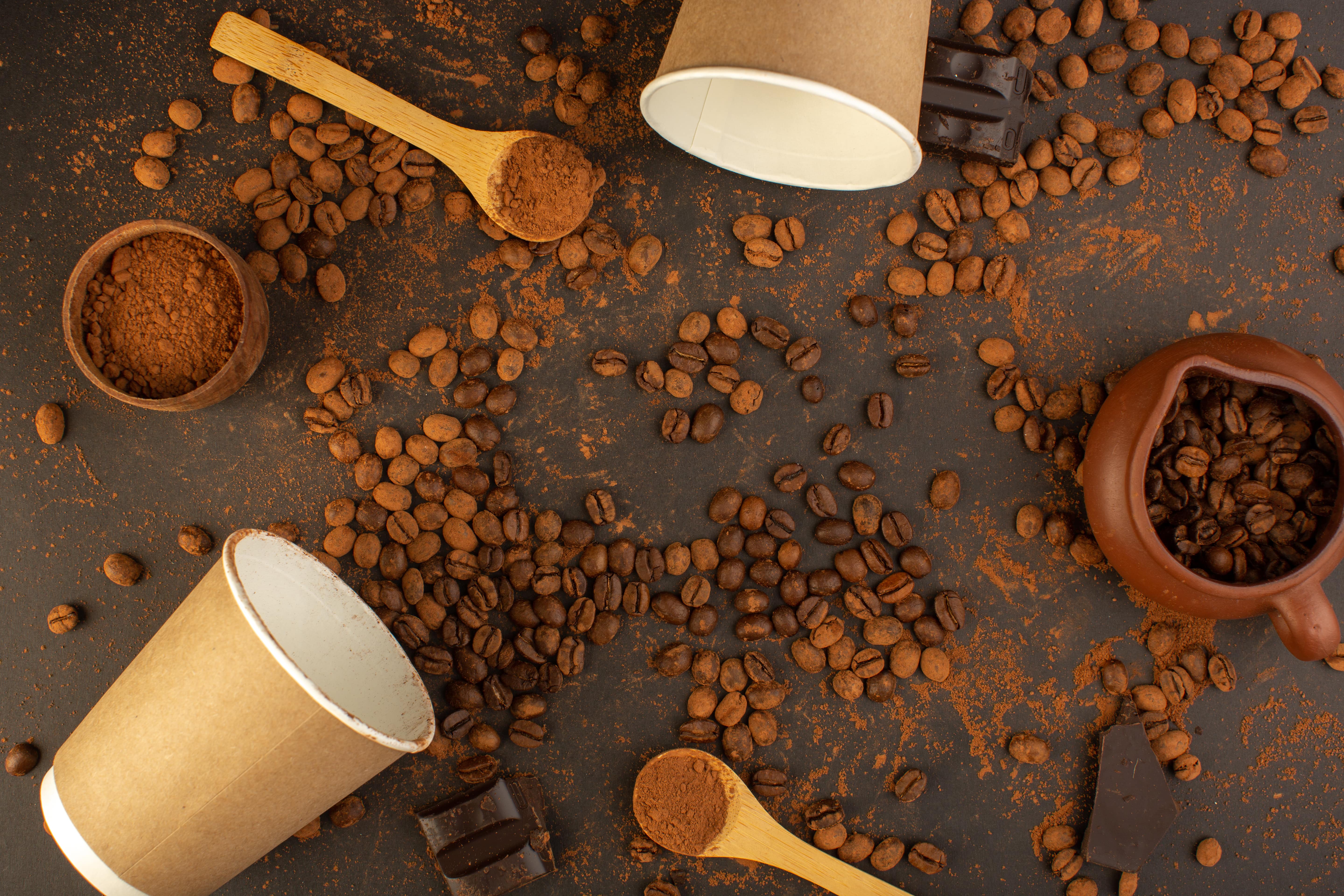
- Spent coffee grounds – needed for fresh coffee, and collected directly from coffee machines, 250,000 tonnes are produced in the UK every year
- Food waste – coffee shops usually also serve food and snacks prepared onsite which create front-of-house and back-of-house food waste
- Single use takeaway cups – these need a specialist recycling stream and usually end up in general waste
- Food packaging – often made from materials such as compostables which need a specialist recycling stream
Recycling Food Waste and Used Coffee Grounds
Many food and beverage outlets like Caffe Nero already have a dedicated food waste collection, improving their sustainability and saving money. When the Simpler Recycling forms come into effect in March 2025, having a separate recycling stream for food will be essential, so having that process in place early makes sense.
For coffee shops like Caffe Nero there’s an added dimension revealed by Matt:
“The chief component of our food waste isn't actually food, it's coffee grounds.”
The UK generates around 250,000 tonnes of waste coffee grounds annually, and for coffee shops, managing wet, heavy coffee waste can be a challenge.
Whilst coffee grounds COULD be included in food waste, they can in fact be recycled separately. There is a market for used coffee grounds so having a separate recycling stream makes sense. The fact that coffee grounds are easily isolated in the coffee bin as part of the coffee making process means it’s simple to keep them separate to food waste.
But where to keep them? Coffee shops often have a small back-of-house space, so storing large amounts of coffee grounds and other waste isn’t an option. A waste partner that offers frequent collections can minimise this problem.
For coffee shops with multi-sites and a large number of staff, having a system for separate waste streams that works for all sites can be a challenge. That’s where an experienced waste partner can help, we have a wide range of waste management solutions for large businesses including cutting-edge reporting, multi-level waste tracking and more.
When does Simpler Recycling come into effect and what does it mean for businesses?
March 2025 sees the start of the Simpler Recycling reforms for most organisations when food waste recycling becomes mandatory.
There will inevitably be a last-minute scramble by organisations to set up their recycling processes in time for the regulations kicking in, so having the infrastructure in place already will mean a simpler transition.
Recycling more – whether that’s food, coffee grounds or other waste – means a reduction in general waste. And with that comes a reduction in waste costs. Waste management firms, including First Mile, charge less for recycling streams when compared to general waste. The more you can recycle, the more you save. And the sooner you can get those additional recycling streams in place, the sooner you save. We can help you set up your systems to comply with Simpler Recycling – here’s how to switch.
As Matt from Caffe Nero suggests:
“my tip is to get ahead of it. Food waste collection has been on the horizon for some time and ..now we've rolled it out to all our stores across the UK.”
Get compliant for Simpler Recycling
Businesses can get ahead of the changes by switching to First Mile, many of our customers are already saving money and recycling more by setting up a dedicated Food Recycling stream with us.
When switching to First Mile, we can handle everything, meaning zero hassle or disruptions to your existing schedule.
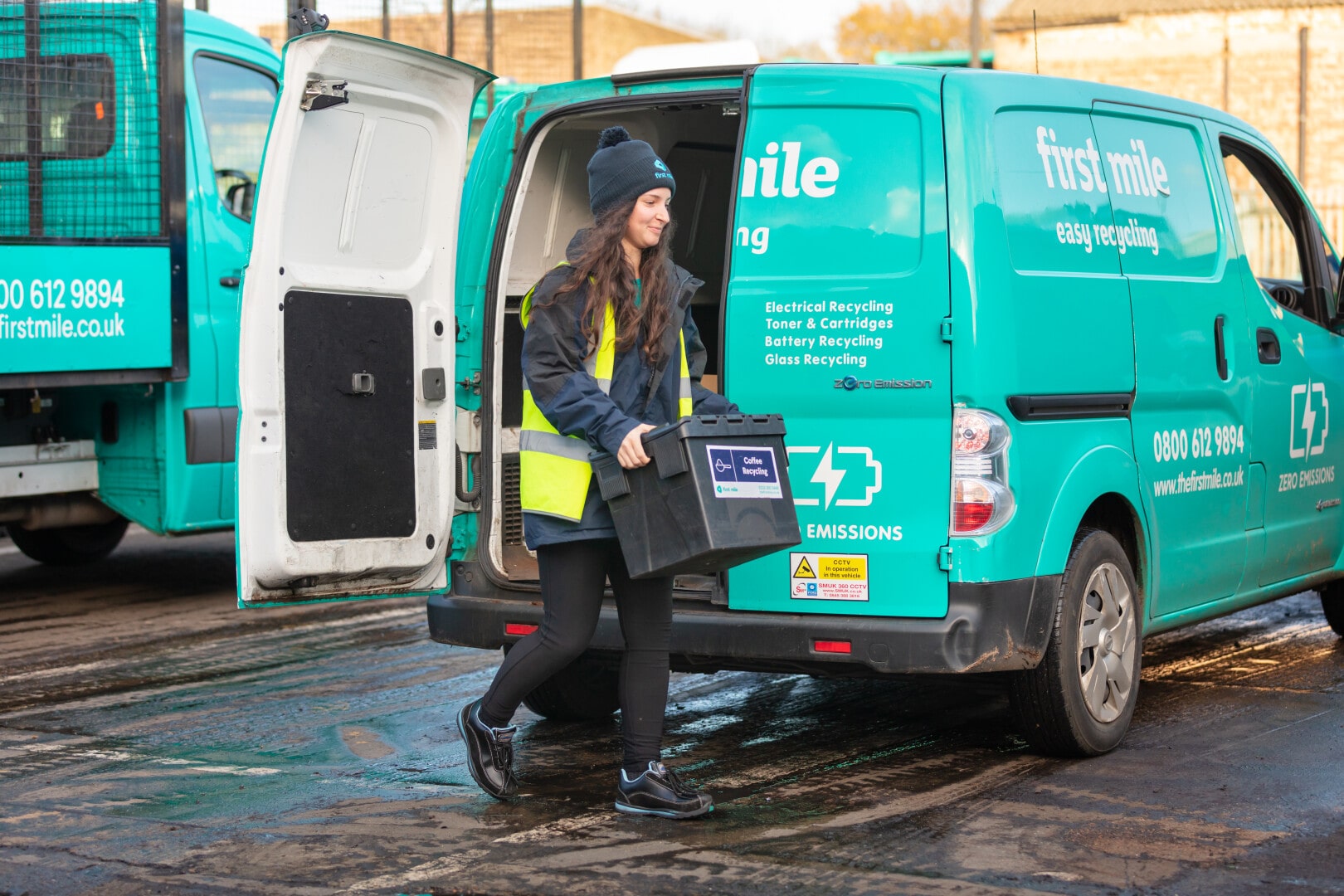
Speak to one of our experts and get a free quote
Can you recycle coffee cups?
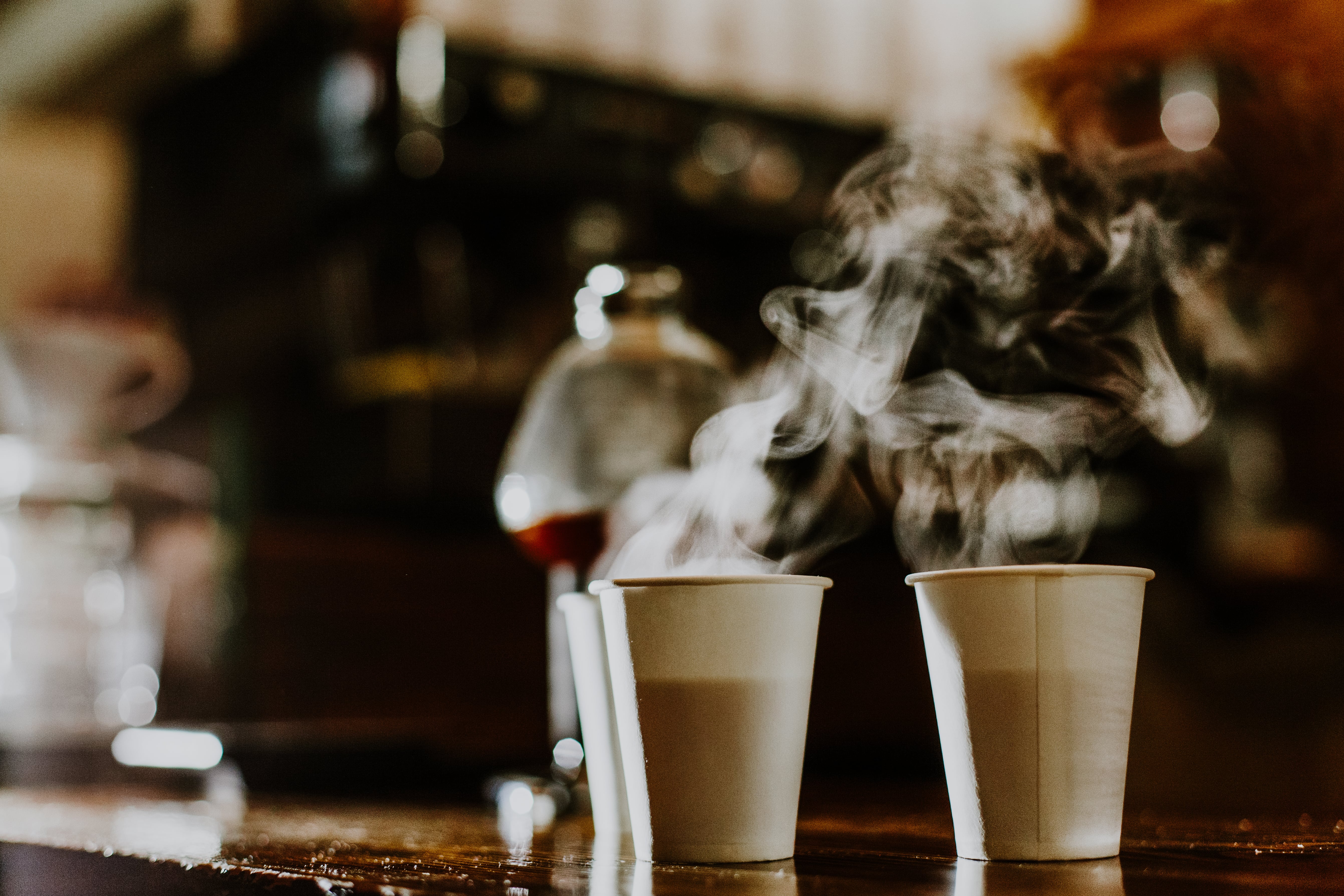
Coffee cups can easily be recycled but only IF they’re collected and put into the right waste stream. Coffee cups are usually made from paper or cardboard which has a thin plastic lining to ensure heat and liquid stays inside the cup. To recycle them requires a process to remove the plastic lining from the paper cup to then recycle both materials through different processes.
This means that coffee cups can’t be put into dry mixed recycling. First Mile offers a single stream paper cup recycling service which can be used alongside your mixed recycling services.
However, by their nature takeaway cups are not still at the place of purchase when they’re done with.
Around 2.5 billion coffee cups are used and thrown away annually, and only 0.25% of these cups, or less than 1 in 400 are recycled.
Caffe Nero have what they call the ‘hand back’ process. As Matt explains, they collect cups in store from any coffee retailer (and that system is replicated in the other large coffee chains).
This voluntary scheme was started in 2018 when major retailers worked together to create a system for collecting and recycling paper cups. It’s a more reliable way of collecting cups for recycling as store staff can make sure they go to the right place. Public bins specifically for cups just end up full of other rubbish too, or cups are put in the wrong place e.g. cardboard or general waste.
How are coffee cups recycled?
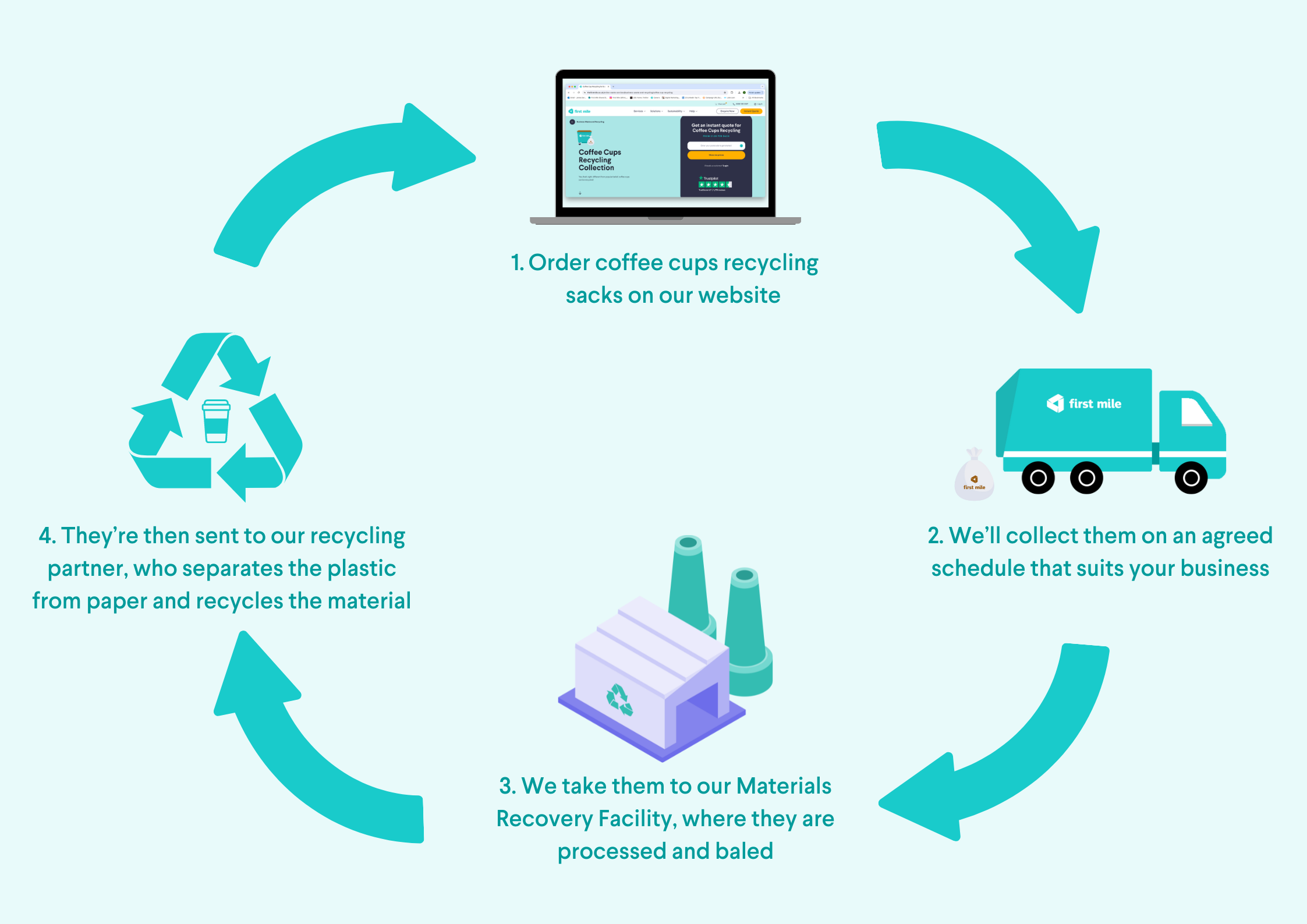
Cups collected from Caffé Nero and other coffee shops by First Mile are sent to our specialist partner for recycling.
There they can separate the plastic from the card and give each material a new life - they're turned into shopping bags, notebooks and cardboard, for example.
What are the rules on coffee cup recycling?
The Government have proposed a mandatory takeback scheme for takeaway coffee cups. It would mean coffee shops having to provide consumers with the opportunity to recycle their disposable cups. The government’s assessment suggested the scheme could improve recycling rates from 0.25% to 39%.
Under the proposed legislation, coffee shops will be required to offer collection points which could be used for their own and their competitors’ used cups and to ensure those cups are collected by a registered waste partner and sent for recycling. All cups would need to be accepted at collection points, regardless of brand or where the drink had been purchased – so basically putting the voluntary hand back scheme into law.
- As the proposal states: By holding producers accountable for the entire lifecycle of disposable cups, the UK government aims to reduce waste, minimise environmental impact, and foster a culture of responsible consumption.
This was originally meant to be introduced from October 2025 as part of the Extended Producer Responsibility for packaging legislation, but it was left out of the regulations published in May There is currently no date in England for this to be made law. In Wales however it has been up and running since April this year. All larger coffee shops and fast-food chains must have cup recycling bins in store to collect disposable cups (of any source – by their nature, takeaway cups don’t end up where they started which is why brands working together makes more sense.)
This new regulation has been introduced together with other mandatory recycling streams, similar to the Simpler Recycling changes coming into effect in England.
How has this new system worked for the Welsh Caffe Nero outlets? We asked Matt:
“So far it's rolled out OK, I think again, because for many of the waste streams we were ahead of the curve. And as I said earlier on, any key piece of advice to give to anyone is get ahead of it - try and do the thinking now”
Sounds like good advice. You can listen to the full podcast on Spotify.
At First Mile we help Caffe Nero and other coffee retailers improve their sustainability with recycling of coffee grounds, food waste, coffee cups and other waste. To set up a collection for your food and beverage business waste, please contact our friendly team.
*University of Kent Business School Research December 2022

